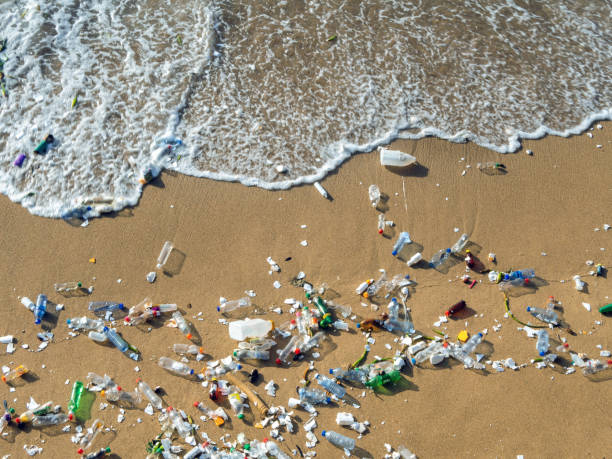Nigeria
Touring plastic into Energy
Plastic waste dumps have the potential to become the oil fields of the future, according to Prof Erwin Reisner. While mechanical recycling can be inconsistent and chemical recycling is currently inefficient and costly, new technologies are being developed to break the chemical bonds of plastic to reclaim valuable resources. Prof Reisner's team has developed a solar-powered system that can simultaneously convert plastic and CO2 into two chemical products - syngas and glycolic acid - without producing harmful waste. Meanwhile, Dr Victoria Bemmer and her team are using machine learning to develop enzymes that can break down PET polyester, aiming to reduce waste textiles to building blocks for new polyesters.
Advertisement

According to Prof Erwin Reisner, plastic waste dumps have the potential to become the oil fields of the future, as plastic is rich in energy and chemical composition. However, only less than 10% of the seven billion tonnes of plastic ever created has been recycled due to the strong chemical bonds that make up plastics. The plastics program manager for the Ellen MacArthur Foundation, Dilyana Mihaylova, states that the take-make-waste economy results in the loss of billions of dollars’ worth of valuable materials. Every year, more than 400 million tonnes of plastic is produced worldwide, with around 85% ending up in landfills or lost to the environment for hundreds, if not thousands, of years.
The challenge of breaking the chemical bonds in plastic waste to reclaim valuable resources is underway. While mechanical recycling can lead to inconsistent quality products, the plastics industry has shown interest in chemical recycling, where additives change the chemical structure of waste plastic to make fuel like petrol and diesel. However, this approach is currently expensive, inefficient, and criticized by environmental groups. The plastics crisis cannot be solved by recycling or plastics-to-fuel processes alone, warns Ms Mihaylova of the Ellen MacArthur Foundation. The search for a solution continues, and a new solar-powered system may offer a potential breakthrough.
Prof Reisner and his team have developed a new technology that can simultaneously convert plastic and CO2 into two chemical products using sunlight. The process creates syngas, a crucial component of sustainable fuels such as hydrogen, and glycolic acid, which is commonly used in the cosmetics industry. The team has integrated catalysts, which accelerate chemical reactions, into a light absorber, making the process work automatically at room temperature and pressure when exposed to sunlight. Prof Reisner has also confirmed that the system does not produce any harmful waste, making it a clean process.
A new technology developed by Prof Reisner and his team can convert plastic and CO2 into two chemical products simultaneously, powered by sunlight. The process creates syngas, a key component of sustainable fuels, and glycolic acid, commonly used in cosmetics. Catalysts have been integrated into a light absorber to accelerate chemical reactions, enabling the process to work at room temperature and pressure with sunlight exposure. Furthermore, the technology produces no harmful waste, making it a clean process.
Dr Victoria Bemmer, a senior research fellow at the University of Portsmouth, says that enzymes found in certain bacteria can be modified to break down polymers. Her team has developed variants of enzymes using machine learning that can deconstruct all types of polyethylene terephthalate (PET), a type of polyester. The enzymes break down plastic in a similar way to chemical recycling, but can be used in more benign conditions, with only water and temperatures up to 70C needed. The team is working to develop enzymes further to create a sustainable circular economy for plastic-based clothing. However, the addition of dyes and chemical treatments makes it difficult to recycle synthetic fabrics using enzymes.

Dr Bemmer and her team are using machine learning to develop enzymes that can break down all types of PET polyester. They hope to reduce waste textiles into simple building blocks that can be used to create new polyesters. However, it is uncertain if the dyes and additives in fabrics will inhibit the enzymes’ ability to break down polyester chains. Meanwhile, Prof Reisner’s team is working on developing their technology to produce more complex products, with the aim of creating an entirely solar-powered recycling plant that can produce sustainable syngas. According to Prof Reisner, sustainable syngas could replace the petrochemical industry that is currently reliant on fossil fuels.
Trending Topics

Recommendation – Stanbic IBTC Bank
Unlock your financial potential with Stanbic IBTC Bank. With a range of loan options, expert support, and flexible repayment terms.
Keep ReadingYou may also like

Review Zenith MasterCard and Visa Gold Credit Card
Discover how the Zenith Gold Mastercard can transform your life and access over 800 lounges worldwide! Click here and find out!
Keep Reading
Access Bank Verve Prepaid Card: Apply now!
Travel with confidence using the Access Bank Verve Prepaid Card with no foreign transaction fees. See more!
Keep Reading

